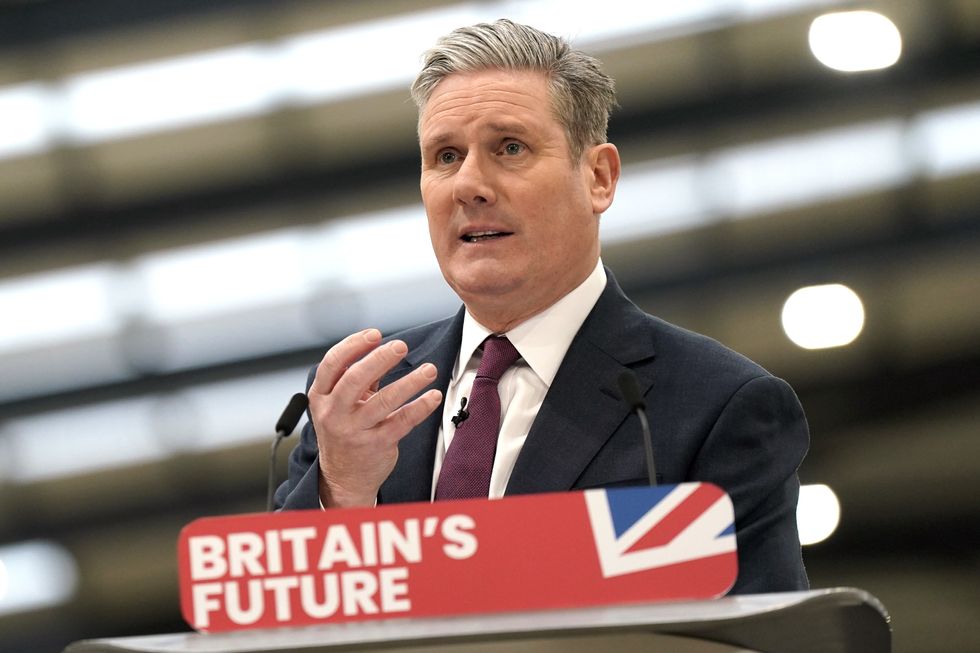
 Press Releases
Press Releases 
Conventional wisdom is that the 2024 General Election is Labour’s for the taking. But with months still to go before the country goes to polls, Keir Starmer’s road to victory may not be quite as smooth as it first appears.
In no particular order, here are the three biggest hurdles I see in store for the Labour leader in 2024:
1. Party unity
When Keir Starmer took office back in April 2020 he inherited a hideously divided party. In 2015 entryists to Labour had voted in Jeremy Corbyn as leader, who in turn had filled both his shadow cabinet and the machinery of the Labour Party headquarters with far-left politicians and activists. In response, a sizable handful of Labour MPs had quit the politics altogether in horror at the antisemitism exhibited by their colleagues.
Keir Starmer can rightly be proud of the work he has done in the years since, painstakingly putting his party back together. Jeremy Corbyn was swiftly expelled, as was his comrade Diane Abbott. The front bench was purged of the left and filled with moderates in Starmer’s own image.

‘When Keir Starmer took office back in April 2020 he inherited a hideously divided party’
PA
But the divisions, though plastered over, are very much still there. Labour activists, who are, on the whole, more left-wing than the parliamentary party are not too enamoured with Starmer – and there are plenty of Corbynite MPs who are nodding along with their leader for now, but will be only too happy to stick the knife in if Starmer puts as much as a foot wrong during the General Election campaign.
Compounding the problem, it is Westminster’s worst kept secret that Starmer and his deputy, the fiery Angela Rayner, have a less-than-perfect relationship – and many MPs believe that she is temperamentally better suited to the role of leader than Starmer, who is considered rather beige. She too is keeping her counsel for now, but can the Labour leader count on her loyal and unflinching support through what is set to be a long and tetchy campaign?
2. Scotland
Labour winning a convincing victory is predicated on the SNP imploding in Scotland. In 2010, Labour held 41 of Scotland’s 59 seats, but in the intervening elections, it lost all but one to the SNP. With the Nationalists down on their knees in recent months, one would expect Starmer to be sitting pretty north of the border. But that’s not necessarily the case.
In fact, now the dust has settled on the Sturgeon affair, the SNP’s poll ratings are rising while Labour’s tumble. Why? One theory is that Scottish voters, who tend to sway more to the left than their English counterparts, mistrust Starmer’s centrism – in particular his close association with Tony Blair. Another is that Scotland’s 200,000-strong North Sea Oil workforce is spooked by Starmer’s pledge that his Labour Government would end North Sea Oil exploration.
What’s more, time and again the SNP has shown that it has a phoenix-like ability to rise from the ashes. Its record in Scotland – on schools, on the drug crisis, on emissions – has been patchy, to put it mildly. But when it comes to an election, Scottish voters have repeatedly shown themselves willing to forgive and forget. The SNP might be mired in controversy now, but history suggests that writing off the party is a fool’s errand.
Whichever way you look at it, Starmer has an uphill battle ahead north of the border.
MORE CONTENT FOR GB NEWS MEMBERS:
3. Electoral mathematics
Riven with infighting, the Tories may not often behave like a Party with a huge majority. But we would be wrong to forget it. In order to win the next General Election outright, Labour doesn’t just have to do well – it has to do extraordinarily well. In numbers: they must recover from their biggest defeat in over 80 years to make 124 gains, something they’ve only ever done three times before in history. Or, put another way, they would need a bigger swing than Tony Blair enjoyed during his 1997 landslide victory.
The catastrophic results for the Tories in by-elections this year prove that it’s a feasible goal, but it’s by no means a given. And it could turn out that Labour’s support – though miles wide – is only inches deep. In the Uxbridge by-election back in July the Tories managed to cling on to the seat by turning the vote into a referendum on Ulez. If a local issue which only affected 10% of drivers was enough to stop the red tide in London, is it really safe to assume that Starmer will be carried into Number 10 on a wave of unstoppable enthusiasm?
All that said, if I were a betting woman, my money would be on a Labour majority. But, as Westminster watchers know only too well, election season can be full of surprises…
24World Media does not take any responsibility of the information you see on this page. The content this page contains is from independent third-party content provider. If you have any concerns regarding the content, please free to write us here: contact@24worldmedia.com